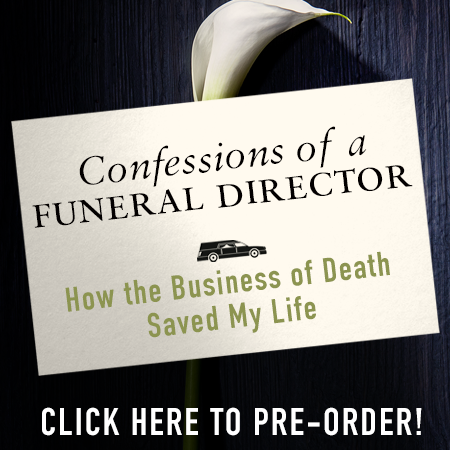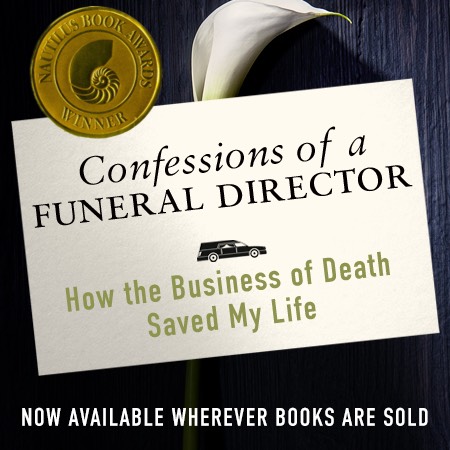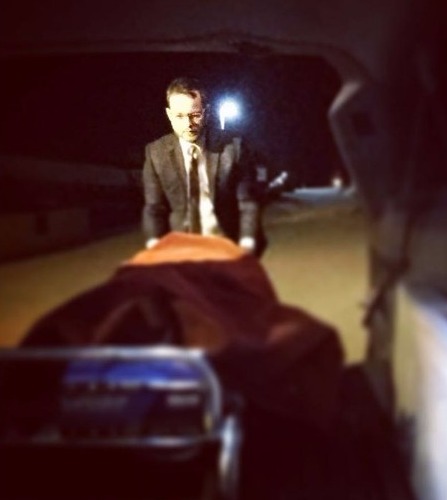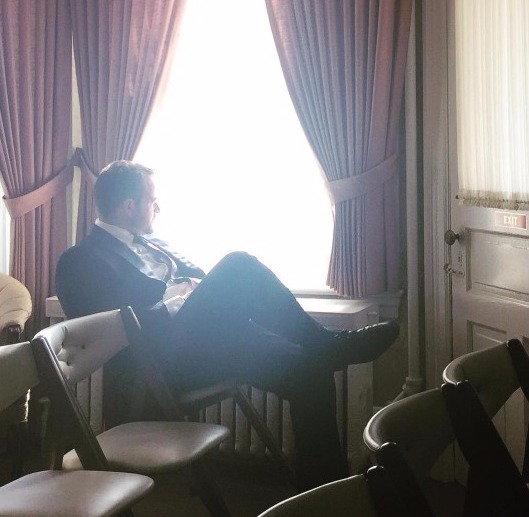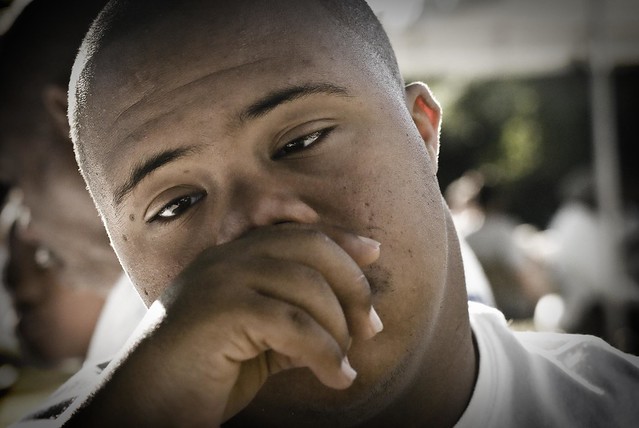Funeral Directing
10 Situations that Make Funeral Directors Feel Awkward
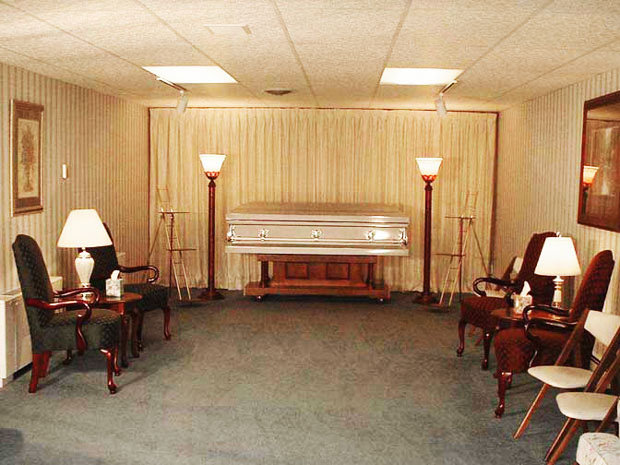
Author: Scary Side of Earth
Author URL: https://www.flickr.com/people/143513894@N04/
One. When you go to pick up the deceased at their home and it’s more than obvious that he/she died during coitus, and you try really hard not to blurt out, “Well, looks like he went out on top.”
Two. When a somebody dies on the third floor of an apartment building the very same day that the only elevator is “Closed for Repair.” So you have to slowly move the deceased down each step while more than twenty people scooch past you on the stairs with a this-is-not-happening look on their faces.
Three. When the deceased has genital jewelry and you have to ask the family if they want it back. “So, mom has jewelry on some of her … lady parts. Do you want that back?”
Four. When the wife and the side-chick of the deceased show up to make funeral arrangements. “Wait, so which one of you is his legal wife?” And they both say, “I am.”
Five. When the long lost son that nobody knew about shows up at the funeral and the widower demands a DNA test right then and there.
Six. When the family wants great grandma dressed in a really revealing dress for her viewing. “Just to be clear, it’s okay that grandma’s cleavage will be showing for her viewing?”
Seven. When the family tells you they have no money for the funeral but they’re only willing to buy the very best casket and the very best vault because “Dad only gets the best”. “Tell me again how you plan on paying for this?” And when they respond, “Oh, we have a GoFundMe account” you have to remind them that GoFundMe accounts aren’t magical money trees, and neither will they provide enough to pay for that Mercedes-Benz of caskets.
Eight. When the deceased wanted Eminem played at her viewing and all the older people are standing in the viewing line with a “what the H-E-Double Hockey Sticks did I get myself into” look on their faces.
Nine. When the drunk friend of the deceased takes advantage of the “open mic” time during the funeral service and starts telling all the horror stories and you have to shut him down with a, “This was really fun, but it looks like your time is up my friend.”
Ten. When the dead body farts during the preview and you take the blame because you know if you blamed it on the dead guy no one would ever believe you.
My book has gobs of stories about death and life. Preorder today!
10 Things That Keep Funeral Directors Up at Night
One. Did I bury that wedding ring?
I know the family wanted the ring taken off before their mom was buried. They told me how important that ring is to them. And I’m almost certain I took the ring off after the service was over. But did I? It was all such a blur.
This question keeps me up for about an hour.
Two. Did I cut that pacemaker out?
We don’t own our own crematory. In our area, there are only about two funeral homes out of approximately 50 funerals that have their own oven. When someone we’re serving wants their family cremated, we send the deceased to a lovely family owned retort that does most of the cremations in a 20 mile radius.
If I leave the pacemaker in, it will explode during the cremation process, potentially causing damage that can have a $10,000 price tag. Sometimes I forget. Although rarely.
Keeps me up 20 minutes.
Three. Is that family gonna beat us?
We pride ourselves on being one of the lowest priced funeral homes in our area. And while this helps us sleep at night, the word has gotten around that not only are the Wildes inexpensive, but they don’t require payment up front. Many funeral homes, in an effort to protect themselves from crooked customers who have no intention of paying their funeral bill, require the funeral payment — or a guarantee of payment by an insurance agency — at the end of funeral arrangements. We give a 30 day payment period and we get swindled by about 10 to 15 families a year.
For the most part, we’ve become wise to the crooked families. But every once in a while there’s a family that is so good at working us, it’s only afterward that we see the signs and we lay awake at night realizing that we’ve been hustled.
10 minutes. It’s just money.
Four. I CAN’T BELIEVE THAT FAMILY BEAT US!!!
And then there are the families we’ve known for ages. The families who went to school with us. Who lived next to us. Who we played with as kids. The families we trust. Families that we never question. Months and months go by and finally, we’re laying in bed and we realize: THEY’RE NOT GOING TO PAY THEIR BILL!
This can be upsetting, especially if we know the family. It’s the broken trust part that can keep you up for two hours.
Five. Is that body going to stink?
Sometimes bodies smell. Sometimes embalming doesn’t stop the stink. And even though we do everything we can to cover up the smell, we can’t help laying in bed at night and wondering, “Is John Smith going to smell up the funeral tomorrow?”
Try to go to sleep as fast as I can so I can wake up early, get to the funeral home and double check John’s b.o.
Six. Twisted Visuals
I’ve been doing this for over a decade and I still see visuals that keep me up at night.
These kinds of visuals can keep me up AND find their way into my nightmares.
Seven. Night Calls
Night calls obviously keep us up at night. If someone dies at a nursing home or at their home in the middle of the night, we get up, suit ourselves up and off we go. This is what I look like the day after a night call:
Eight. How Long Can I Keep Doing this?
Career-doubt is a real thing. For me, the pace and the drain of death care undergirds a good amount of career-doubt. There are many times I miss my son’s life because I’m out at all hours of the day dealing with death. Night calls, night viewings, and the like make me less the father I want to be. I lay awake thinking about this.
This can keep me up for hours.
Nine. Was That Joke Too Awkward?
Okay. Maybe this is only me. I’m the king of awkward jokes. Sometimes the jokes are so awkward, I lay awake at night and repeatedly tell myself, “Caleb, you must never joke again. Caleb, you must never joke again ….”
Ten. What Did I Forget to Do?
Some days the funeral home feels like the floor of NYSE in that it’s all crazy and hectic and movement. The phone’s ringing with requests for reordered death certificates, the door bells ringing and there’s someone there who needs help with insurance policies, some of us are out picking up from a hospital, others are running around getting death certificates, and there’s a couple families are coming into the funeral home to make arrangements. After a hectic day where your brain felt like a Gallagher watermelon, you’re laying in bed at night and remember, “there was that phone call where the family wanted me to add the deceased’s cat ‘Jinx’ to the obituary … damn it.”
*****
If you like my writing, consider buying my 2017 Nautilus Book Award Gold Winner, Confession of a Funeral Director (click the image to go to the Amazon page):
The 10 Hardest Parts of the Funeral Industry
Each and every job has its hard parts. Here are 10 aspects of the funeral industry that I find difficult.
One. The Silence
Silence is the voice of death. It’s antithetical to the pursuit of Americans. Most of us are programmed to want answers to our questions, truth to our doubts, words to our emptiness and meaning to our voids. But when I’m sitting with a family making arrangements for their dead loved one’s funeral, sometimes I look them in the eye, I say “I’m sorry for your loss”, and then comes the most difficult of all things: the absence of answers, the lack of truth, the void of our existence and the silence of death. We just sit, acknowledge the silence, and embrace the sacred moment.
Two. The Money
Aside from the silence, tallying up the bill is always difficult for me. It’s not that our funeral home is expensive. We pride ourselves on being the least expensive funeral home in our area. It’s not that we’re trying to rip people off. We do believe our prices are fair and honest. It’s just that bringing up money when we’re talking about death seems like sacrilege. Sure, we have to pay our bills. Sure, paychecks are good. It’s just difficult for me, and I imagine many other funeral directors as well, to capitalize on death.
Three. Flirting
Having mature women flirt with me is … not that difficult. Yeah, I actually like that part. What funeral director doesn’t mind the occasional, “If I was 40 years younger” comment?
Four. Tragic deaths
These are the kind of deaths that come home with us. You just can’t help it. There’s not a funeral director that isn’t affected by the death of a child, the car accident, the overdose or the suicide.
Five. Transference
Some people have major problems and baggage that get fanned to flame by grief and bereavement. Often times, they take their problems, their anger, their frustration and instead of dealing with their grief and bereavement, they take it out on us. If you’ve been in the business long enough, you know not to take it personally, but it’s nonetheless difficult to take a capricious verbal lashing for no apparent reason other than transference.
Six. Morticians not Magicians
There are some faces that we can’t restore.
Some bodies that are too far gone.
Sometimes it’s nearly impossible to make the dead look alive.
Sometimes, the process of securing a doctor’s signature, getting cremation approval from the county and the line up at the crematory means we can have everything finished in the time you want it to be.
I wish we had a magic wand, but there are things we can’t do. Wishing we could, but knowing we can’t isn’t an easy idea for you to accept, but it’s even more difficult for us to accept as we like to think we’re more capable than we really are.
Seven. The Night Calls
There’s no amount of coffee that can compensate for the lack of sleep caused by a 2 AM night call.
Eight. Meeting Our Own Demons
There are certain things in life, like marriage, or our kids, that have a tendency to summon our hidden demons. I’ve often said that I was a great person before I got married and then I saw just how selfish and prideful I really am. Death and the funeral industry can have a similar effect. Death culture is like the refining of gold; all of our impurities, our stress, our own anxiety, and our pride can come seeping out in the heat of the moment. But that very heat, while revealing our difficult demons, can also purify us and make us more beautiful.
Nine. Dress clothing
I like nice suits and I’m an absolute shoe addict, but wearing a suit on a sweltering mid-summer Pennsylvania day is an exquisite form of torture. I don’t believe in hell, but wearing a black suit in 100-degree weather is pretty damn close.
Ten. Personal Relationship Strain
I suppose every friend will disappoint you once in a while; but funeral directors will probably do it more often. We might miss your birthday party, we might have to leave in the middle of dinner.
Death has this way of keeping an untimely schedule. And as death’s minions, we’re tied to that schedule. Whether it be in the middle of the night, or in the middle of your wedding, when death calls, we have to respond. That respond-ability marks having a personal relationship with us somewhat difficult.
*****
If you like my writing, consider buying my 2017 Nautilus Book Award Gold Winner, Confession of a Funeral Director (click the image to go to the Amazon page):
10 Reasons I’ve Stayed in the Funeral Business
I’m coming up on 10 years licensed, a significant milestone considering that my embalming professor told me that 70% of funeral students never make it to the decade mark. To be honest, I never thought I’d make it this far. After I graduated mortuary school, I told my dad, “I think I’ve only got about 10 years for this business.” At the time, the constant barrage of death and dying, the night calls that I was always running and the dynamics of death culture had me doubting my resiliency. I also had aspirations of becoming an academic (something I’m still pursuing because I’m a nerd). But, here I am 10 years later, more committed than ever to the funeral business, so I thought I’d list 10 reasons why I’ve been able to stay. These reasons aren’t a catch-all for every funeral director, but they’re reasons why I’m still here.
Service.
Admittedly, I don’t wear a smile when my cell phone rings at 2 AM in the morning for a death call. Although I’m eventually kind, courteous and congenial when I go on the midnight call, even after 10 years those midnight death calls still wear on my like a weight. The chaos of death isn’t a healthy lifestyle with its unscheduled hours, its highly emotive culture and the demands that come with it. I think most funeral directors will agree that this business is not easy. But something happens to me when I see the family of the deceased. One minute I’ll be tired, unhappy and beaten, and the next minute I’m full of compassion, energy, and resiliency. There’s still something wonderful about the service aspect of this industry that keeps me here, that sustains me during the tough hours.
Our Associates.
Ten years ago I didn’t have enough appreciation for the people we rub elbows with. Death has a way of drawing out the beauty in humanity, which is why funeral directors are privy to some of the most beautiful people in the world. Whether it be the hospice nurses who give so unselfishly, the flower shops who help us out at the last minute, the sextons that waive fees for infants, the pastors who work tirelessly to help families, and any angel who has ever given us free coffee. If I ever left the funeral business, I’d miss crossing paths with so many wonderful people.
Humor.
From tweets about tying shoestrings in preparation for the Zombie Apocolypse, to finding the lighter moments at funerals, I’ve managed to make a distinction between serious and solemn. Death is a serious matter, but it doesn’t have to be solemn. That permission to laugh and lighten the mood has been a key part of my resiliency in this business.
No
If there’s one word that is utter sacrilege in a smaller funeral home like ours, it’s this tiny two-letter word. We simply don’t use it. I mean, when can we ever say “no” to a family that just lost their loved one?
But if we’re to survive, we have to introduce it into our professional vocabulary. Death has a way of being more demanding than life, especially the personal life of a funeral director. Death constantly clears our personal schedule books. We’re supposed to go to our son’s baseball game, but there’s an evening viewing. We’re supposed to have Christmas dinner, but there’s a death call. We’re supposed to go on a date, but there’s a family that wants to come in and make arrangements in the evening.
We have to find a way to allow ourselves to live our own lives in the midst of death. Sometimes that means hiring others to do some of our work, and sometimes that means creating better organizational systems and sometimes it simply means saying “no.” If I hadn’t learned to say “no”, I would have burnt out of this business years ago.
Affirmation.
Being told, “You’ve made this so much easier for us.” or, “Mom hasn’t looked this beautiful since she first battled cancer”, or “You guys are like family to us” means a lot to me. It’s important to know that what you’re doing is meaningful for the person you’re doing it for.
That verbal affirmation is huge in sustaining those of us in the dismal trade.
The Calling
I’ll be the first to admit that I don’t like the term “calling”. I’ll also be the first to admit that I never felt called to this business.
Callings aren’t predetermined nor are they divinely ordained. Neither are they mystical or set in stone. They’re not our “dream jobs” that can only be obtained with supreme talent, intelligence and luck.
A calling is when we hear the voices of those needing our help. Callings can arise in the darkest jobs, in the most monotonous of tasks and at the “lowest” positions. Callings are something we learn to love. Callings are something we choose to do because we develop an ear to hear and an eye to see. A person who is “called” is a person who has seen a need and answered so many times that it becomes a part of who they are.
Now, more than a decade in, I’m staying in this business because this call is something I now answer so naturally that it’s become a part of who I am.
$$$
When I was younger, I thought money didn’t matter. I’m older now. Consistent paychecks are good.
The Stories.
I love hearing tales of death and dying. Call me morbid, but I just find so much wonder, sacredness, spirituality and beauty in death stories. The stories are my ballast.
Empathy Vs. Sympathy
There’s a saying in the funeral business that goes something like this, “treat every family as though they were your own family.” That’s a nice sentiment, but it is not entirely practical.
There are times (at funerals especially) when all we can give is sympathy. When it’s outside of our ability to fully empathize with a person’s situation. After all, the person laying in the casket isn’t my father. This isn’t my daughter. This isn’t my family.
And that’s our job. You pay us to be directors. And we couldn’t handle much more. We have to maintain a certain level of objectivity because there’s only so much pain, grief, and heartache we can share until we too start to crash … burn out.
But, there are other times when you can’t help but be drawn into the narrative so that you enter the narrative and become a character in the story. Not just a director, but an actual character in the drama of life and death.
Sometimes all I can do is sympathize. Other times, I empathize. Allowing myself the permission to do both has been key.
Self-Care
I’ve been close to being burnt out. Landed in the hospital. Reevaluated life. I started to seeing a psychologist. I started anti-depressants. I started writing more. I started going to the gym more. Saying “no” more often. I started to realize that if I wanted to take care of others, I had to take care of myself. Self-care is the unselfish act of selfishness and I know for a fact that I’d be out of this business if I didn’t practice it.
When Love and Power Clash at a Funeral
Although I may come across as a beta male, I’ll be the first to admit that I’m no saint when it comes to self-centeredness. I sit somewhere between the egoless Mother Theresa and egomaniac Donald Trump. Self-care and a healthy application of “treat yo self” are essential for those of us in care-giving professions, but the line between Trump and self-care isn’t always so clear. The very fact that I blog probably means I’m more of an egotist than I care to admit. All that to say: as much as I dislike people with bloated egos, I’m guilty too.
Perhaps ironically, the local church tends to be a gathering place for narcissistic personalities. I don’t think it’s a cause of religion, but rather that churches are always looking for volunteers and workers and will gladly give leadership positions to anyone who might be willing, despite their character deficiencies. Of course that isn’t always the case, but in the church funeral that I worked today, the church appointed funeral concierge had an ego the power and size of a supernova.
John was horrible (name changed for obvious reasons). When we arrived at the church to set up for the funeral, John (who is a church deacon) decided it was his job to micromanage our every move. I’ve seen Johns throughout the course of my ten year career. In my personal life, I keep a healthy distance from those that tend to overly assert themselves and their opinions, but in my professional life I have little choice but to work with and even attempt to serve those with caustic narcissistic propensities.
There’s been a couple Johns that have been so overbearingly bossy that they’ve even made the family members cry. I remember one such John tell a young granddaughter, “You can’t wear a skirt above the knee in this church!” Unfortunately, she wasn’t wearing “no run” mascara.
This John didn’t make anyone cry, but he was a talented John. He was able to simultaneously dish out commands while bemoaning the fact that one of the “irreplaceable” glass vases on the church sanctuary chandelier was broken by the “stupid cleaning lady.” He managed to tell most of the family members that “his” glass was broken (he also continually called the church “his” church) and he can’t imagine how people can be so insensitive.
By the time the service was about to start, John was barking about how I was to put the pall on the casket and at this point I lost my funeral director cool and responded, “Do you want to put the pall on yourself or are you just interested in bossing me around?” He snorted and whispered something under his breath.
To contrast John, the congregation was full of a special and select group of individuals who rarely seem to be tempted by the lures of power. The deceased person (named Jennifer) had Down syndrome and all of her friends had come to say their final good-bye. Most of the people I know with Down syndrome have a beautifying effect on their family and friends. It’s not necessarily because DS produces more happiness (studies show that depression plagues those with DS), nor is it because caring for someone with DS makes everything easier (although there are reports that divorce rates drop in families that have a DS member), but it seems that position prominence, egotism and power hunger have little persuasion on these treasures of humanity. It’s as if that extra chromosome 21 provides a trade off where there’s less mental capability but more character capacity, as it provides immunity to those things that make people into assholes.
The contrast was very stark. They often are at funeral as people let down their nuanced guard. On the one hand there was John and on the other hand there were people who could care less about power and control. And the reminder that love is better, more human and more meaningful than power was also on display. This funeral was for a small girl with Down syndrome who didn’t have any power connections in life. She wasn’t a supervisor at her job, she didn’t hold any church positions, nor was she known to be an authority in any field of knowledge. And yet, the church was full. It wasn’t full because of her place in the world, but because of her place in people’s hearts.
Love isn’t like math. Basic math is something that is easy to remember. It’s hard to forget that 2 + 2 = 4. But the basics of human connection, like love and empathy, are seemingly so very simple and yet we need to be reminded over and over and over again of their value. Today, the value of love was on display at Jennifer’s funeral. Today, at this funeral, while John was abusing his power at church, the church was celebrating a life that found a way in the world through love.
